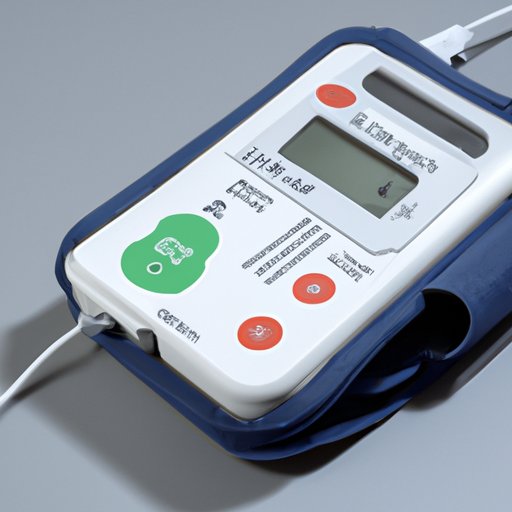
Introduction
If you suffer from chronic pain, you may have heard of TENS therapy. TENS (Transcutaneous Electrical Nerve Stimulation) therapy is a non-invasive, drug-free method of pain relief that involves applying electrical impulses to certain areas of the body. TENS units are often used to treat conditions such as arthritis, fibromyalgia, and back pain. While TENS therapy can be a lifesaver for those coping with chronic pain, it’s essential to use a TENS unit safely and effectively to avoid any potential risks. In this article, we’ll explore the dangers of overusing a TENS unit, ways to maximize the benefits of TENS therapy without overdoing it, and how to make the most out of your TENS unit without abusing it.
Exploring the Dangers of Overusing a TENS Unit
While TENS therapy is considered safe when used correctly, overusing a TENS unit can result in various risks, including:
Risks of Skin Irritation
Using a TENS unit for an extended period can cause skin irritation. The adhesive pads used to apply the electrical impulses can cause redness, itching, and even blisters. People with sensitive skin or those prone to allergic reactions may be more at risk of skin irritation due to TENS therapy. It’s essential to keep the skin dry and clean and change the pads regularly to avoid skin irritation.
Risks of Tissue Damage
Using a TENS unit on a particular area for too long can cause tissue damage. This can happen for a few reasons. Firstly, the electrical impulses from the TENS unit can cause muscle contractions, leading to microtears in the muscle fibers. Secondly, the electrical impulses can cause blood vessels to constrict, reducing oxygen flow to the tissues. This can result in tissue damage and even tissue death (known as necrosis). Finally, using the TENS unit on an area with an injury or inflammation can worsen the condition, leading to further tissue damage.
Risks of Nerve Damage
While rare, overusing a TENS unit can cause nerve damage. This can occur due to the electrical impulses from the TENS unit being too strong or being applied for too long. Nerve damage can cause pain, numbness, tingling, and even paralysis. It’s crucial to follow the guidelines for TENS use and never use the TENS unit on your head, neck, or face.
Guidelines for Safe TENS Use
To avoid any potential risks, it’s important to use a TENS unit safely and effectively. Here are some guidelines to follow:
- Always read the instructions carefully before using the TENS unit and follow the recommended settings.
- Don’t use the TENS unit on broken or irritated skin.
- Don’t use the TENS unit on your head, neck, or face.
- Don’t use the TENS unit while driving or operating machinery.
- Don’t use the TENS unit if you have a pacemaker or other implanted electrical device.
- Don’t share your TENS unit with anyone else.
- Always consult with your doctor before starting TENS therapy.
Maximizing the Benefits of TENS Therapy Without Overdoing It
Advantages of TENS Therapy
TENS therapy can provide relief for many types of pain and has several advantages over traditional pain management methods. TENS therapy is non-invasive, drug-free, and can be used at home. It’s also relatively safe when used correctly and can be an effective way to manage chronic pain without the risks associated with long-term use of pain medication.
Tips for Effective TENS Use
To get the most out of your TENS unit and avoid overuse, follow these tips:
- Start with the lowest intensity setting and gradually increase as needed.
- Use the TENS unit for short periods, no more than 30 minutes at a time.
- Space out TENS sessions to avoid overuse.
- Don’t use the TENS unit on the same area for more than an hour per day.
- Listen to your body and adjust the settings or stop using the TENS unit if you experience any discomfort.
Discouraging Overuse
It’s important to remember that TENS therapy is not a cure for chronic pain and should be used in conjunction with other pain management methods. Overusing the TENS unit can lead to risks and may even cause the body to become desensitized to the electrical impulses, reducing the effectiveness of the therapy over time. It’s best to use the TENS unit as directed and in moderation to achieve the best results.
TENS Therapy: The Fine Line Between Beneficial and Harmful Use
Importance of Balance in TENS Therapy
While TENS therapy can be an effective way to manage chronic pain, finding the right balance between beneficial and harmful use is essential. Overusing the TENS unit can lead to risks, while underusing it can result in ineffective pain relief. It’s crucial to follow the guidelines for TENS use and communicate with your doctor if you have any concerns.
Identifying Signs of Overuse
If you’re using a TENS unit regularly, it’s important to be aware of the signs of overuse. These may include:
- Increased skin irritation or redness
- Muscular weakness or fatigue
- Numbness or tingling in the affected area
- Increased pain or discomfort
Tips for Adjusting TENS Therapy
If you’re experiencing any of the above symptoms, it’s essential to adjust your TENS therapy accordingly. This may involve reducing the intensity or duration of the therapy or using alternative pain management methods.
When Less is More: The Benefits of Limiting TENS Therapy Use
Reasons to Limit TENS Use
While TENS therapy can provide effective pain relief, using it over the long term may lead to risks such as skin irritation, tissue damage, or nerve damage. It’s important to limit TENS use to avoid these risks and explore alternative pain management methods if necessary. Additionally, the body may become desensitized to the electrical impulses over time, reducing the effectiveness of the therapy.
Alternative Pain Management Options
If you’re experiencing chronic pain, there are various alternative pain management options to explore in addition to TENS therapy. These include:
- Physical therapy or exercise
- Acupuncture or acupressure
- Massage or chiropractic care
- Medications (taken as directed by your doctor)
- Relaxation techniques, such as deep breathing or meditation
Encouraging Moderation
While TENS therapy can be a valuable tool in managing chronic pain, it’s crucial to use it in moderation. By limiting the use of your TENS unit and exploring other pain management methods, you can avoid potential risks and achieve the best possible pain relief.

How to Make the Most out of Your TENS Unit without Abusing It
Practical TENS Unit Use Tips
To get the most out of your TENS unit without overusing it, try these practical tips:
- Experiment with different electrode placements to find what works best for you.
- Don’t use the TENS unit while sleeping to avoid skin irritation or discomfort.
- Control your breathing while using the TENS unit to enhance relaxation and pain relief.
- Use the TENS unit in conjunction with other pain management methods, such as physical therapy or medication.
Troubleshooting Ideas
If you’re having trouble using your TENS unit effectively, these ideas may help:
- Consult with your doctor or a physical therapist for guidance on TENS use.
- Try a different brand or model of TENS unit to find what works best for you.
- Ask others who have used TENS therapy for their advice and tips.
Emphasizing Safe Use
Remember that safe use of your TENS unit is crucial for effective pain relief and avoiding potential risks. Always follow the guidelines for TENS use, monitor your symptoms, and never hesitate to consult with your doctor if you have any concerns.
Conclusion
In summary, TENS therapy can be an effective tool in managing chronic pain, but it’s important to use the TENS unit safely and effectively to avoid any potential risks. By following the guidelines for TENS use, maximizing the benefits of TENS therapy without overdoing it, and exploring other pain management methods, you can achieve the best possible pain relief while avoiding any potential risks. Remember to always consult with your doctor before starting TENS therapy and listen to your body to adjust the therapy as needed.
Final Thoughts on Safe TENS Use
Remember, TENS therapy is not a cure for chronic pain and should be used in combination with other pain management methods. Be aware of the potential risks of TENS use and don’t overdo it with your therapy. By using your TENS unit safely and effectively, you can achieve the best possible pain relief and maintain your health and wellbeing.





